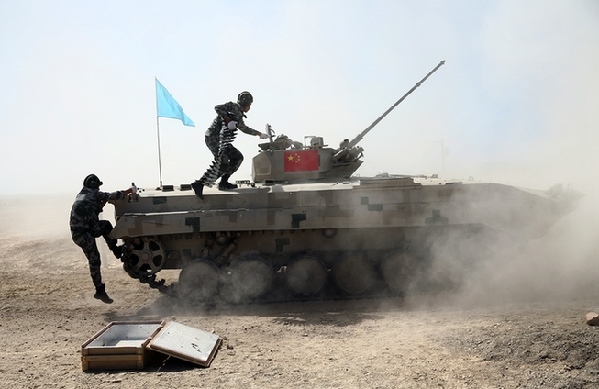|
Soldiers load ammunition onto a tank on Aug 4 during the International Army Games 2017 in Korla, Xinjiang Uygur autonomous region. [Photo/China Daily] |
Lu Donghua carefully lifted the QW-2 antiaircraft missile launcher to his shoulder, drew a breath, and then pulled the trigger. Within seconds, he was watching his target “blossom like a flower” in the sky.
“Just imagine if that target was an attack helicopter sent by the enemy in a real battle,” the 26-year-old private with the People’s Liberation Army Ground Force said shortly after jumping down from atop a 92A infantry fighting vehicle.
The target was in fact a large circular board about 1.5 kilometers away in the Gobi Desert that had been raised 13 meters above the ground to simulate a helicopter strike.
Four days earlier, on Aug 1, Lu had also shredded a moving target in an antimissile exercise to begin his air-defense unit’s campaign at the International Army Games 2017 in Korla, a city in the Xinjiang Uygur autonomous region.
The games, known as the Military Olympics, were initiated by Russia in 2014. This year, for the first time, China hosted four sections: Suvorov Attack, Clear Sky, Safe Environment and Gunsmith Master.
Militaries from 10 countries competed under the blazing desert sun from July 31 until Saturday. According to the official results released over the weekend, teams from the PLA Ground Force won 11 contests over the four sections.
Colonel Tan Yingshuai, a spokesman for the PLA Ground Force, said he believes any military that can claim victory in the International Army Games is also likely to succeed on a real battlefield.
Historic opportunity
Like many soldiers who took part, Lu put the success down to China’s unprecedented military reform, which has focused largely on improving combat training for the armed forces.
The Central Military Commission unveiled an overall reform plan in July 2015, which was quickly followed by a decision to cut 300,000 troops as well as revamp the command system. The commission, headed by President Xi Jinping, pledged to establish a leaner and more efficient chain of command, reduce the number of noncombatant personnel and departments, and build the PLA into a mighty force capable of winning a modern war.
Follow this news feed: East Asia






